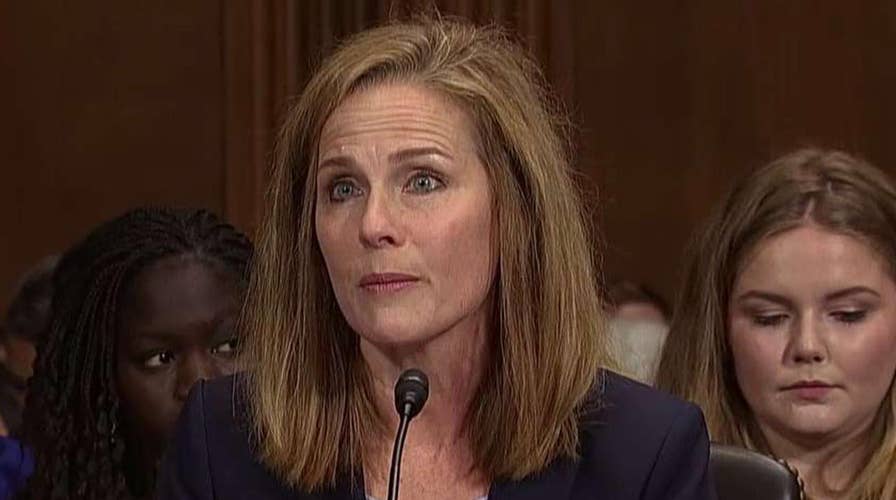A closer look at Judge Amy Coney Barrett
Supreme Court frontrunner's perceived views on abortion are being scrutinized.
To save the remaining time on his term, preserve Republican control of Congress and place himself in the best position to win the 2020 presidential election, President Trump should nominate Judge Amy Coney Barrett of the 7th U.S. Circuit Court of Appeals to fill the opening on the U.S. Supreme Court.
Several news organizations reported Monday that Barrett was one of four federal appeals court judges who are candidates for the high court appointment interviewed by President Trump on Monday. The candidate the president nominates would fill a vacancy created by the retirement of Justice Anthony Kennedy, if the nominee wins Senate confirmation.
The other judges the president is reported to have interviewed Monday were Brett Kavanaugh of the District of Columbia Circuit, along with Raymond Kethledge and Amul Thapar of the 6th Circuit.
While Barrett’s nomination for the Supreme Court would likely cause the most vicious confirmation hearing since that for Justice Clarence Thomas, it would be well worth it for conservative members of Congress who provide President Trump his legislative base. Barrett is a judicial newcomer and has been a judge for less than a year. She doesn’t have an extensive judicial record that Democrats could attack during a confirmation hearing.
The Senate battle over Barrett’s confirmation would cement trust between the president, social conservative voters and the members who represent them in the House and Senate.
Barrett’s nomination would energize Republicans ahead of the November midterm elections and build permanent credibility with conservative members of the Senate in case of a possible impeachment trial of President Trump.
The judge’s presence on the Supreme Court would allow Republicans to reach judicial nirvana and accomplish through the Supreme Court what they couldn’t do through Congress.
Barrett’s confirmation could radically shift American laws on issues like religious freedom and abortion. Since she is only 46 – young for a Supreme Court justice – she could serve on the high court for more than three decades.
Sen. Diane Feinstein, D-Calif., opposed Barrett vehemently during Barrett’s Senate confirmation for the 7th Circuit Court of Appeals last year. Feinstein implemented what many called a religious test, blasting Barrett for her deep Catholic faith, calling it “dogma.”
Feinstein specifically referenced a 2006 graduation speech where Barrett made several references to God. Barrett told graduates: “No matter how exciting any career is, what is it really worth if you don’t make it part of a bigger life project to know, love and serve the God who made you?"
While these representations are anathema to many Democrats, it is precisely what conservatives want to hear from a potential Supreme Court justice, meaning that Barrett’s nomination would likely permanently bond them to President Trump.
Barrett’s conservative credentials are impeccable. She once clerked for Supreme Court Justice Antonin Scalia, taught law at the University of Notre Dame, and has reported conservative views about protecting religious freedom. She is a member of the conservative Federalist Society, a conduit for judicial nominees to the Trump White House. She is reported to belong to a small, tightly knit, conservative Christian group called People of Praise.
Barrett has written and spoken frequently about the importance of her Catholic faith and in her belief that life begins at conception. While President Trump said he’s not going to ask the candidates whether they would vote to overturn the landmark 1973 Roe v. Wade ruling that legalized abortion nationwide, the candidates’ view on this topic will be determinative in securing the nomination.
Crucially, Barrett was already confirmed by the Senate eight months ago by a 55-43 vote for her seat on the 7th Circuit Court of Appeals. She secured the votes of a few critical Democratic senators from moderate states, including Joe Manchin of West Virginia and Joe Donnelly of Indiana.
Winning the support of a few Democrats could be the key to winning Senate confirmation for Barrett if she is President Trump's pick to replace Kennedy. Senators Manchin, Donnelly and Heidi Heitkamp of North Dakota are three Democrats facing tough difficult re-election races who could find it difficult to oppose Barrett. All three have already met with President Trump to discuss his upcoming Supreme Court nominee.
The president is not guaranteed the votes of all 51 Republican senators for his Supreme Court nominee.
Sen. John McCain, R-Ariz., remains absent from the Senate as he battles brain cancer.
Sen. Susan Collins, R-Maine, said Sunday on ABC’s “This Week”: “A candidate for this important position who would overturn Roe v. Wade would not be acceptable to me, because that would indicate an activist agenda that I don’t want to see a judge have.”
And Sen. Lisa Murkowski, R-Alaska, has supported abortion rights in the past, so her vote on a candidate expected to overturn Roe v. Wade remains in question.
President Trump’s selection of Judge Barrett would eviscerate Republican concerns that he might nominate someone who is not a hardline judicial conservative voice.
The unofficial Republican motto on Supreme Court nominees since 1990 has been “no more Souters” – a reference to now-retired Justice David H. Souter, who was nominated by President George H.W. Bush in that year. Souter was a little-known judge from New Hampshire, but the White House team assured Republicans he was a conservative. He turned out not to be.
One of the most underappreciated reasons that Donald Trump won the 2016 election was that many voters were motivated to cast ballots by a vacancy on the Supreme Court. One in five voters interviewed in exit polls said Supreme Court vacancies were one reason they had voted.
The best hope for President Trump in 2020 and the Republicans in Congress this November is an energized base of conservative voters. The single best way for the president to ensure continued control of Congress and increase his odds of winning re-election is to appoint Judge Barrett. His presidency depends on it.

